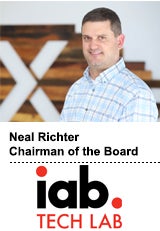 Neal Richter, has been elected chairman of the IAB Tech Lab, the industry group said Thursday.
Neal Richter, has been elected chairman of the IAB Tech Lab, the industry group said Thursday.
Richter has been a leader within the Tech Lab for years, helping develop IAB openRTB specs since their first iteration, and helming recent initiatives like Ads.txt and Sellers.json. It’s been a productive year for Richter, since he took on the new role of chief scientist at SpotX in June, after two years as CTO of Rakuten Marketing.
AdExchanger caught up with Richter on his thoughts and priorities for the IAB Tech Lab.
AdExchanger: What is the focus for the Tech Lab this year?
NEAL RICHTER: The next year is about preparing and responding to what’s going to happen with various kinds of identifiers. There’s DigiTrust (the cookie-based ID consortium the IAB Tech Lab acquired last year) and the Transparency and Consent Framework (the ad tech industry solution for passing consent signals in the digital supply chain), but we’re also working on things like connected TV and IoT standards.
At first, the dominant conversation for the Tech Lab was about how to add standards where standards didn’t exist, like openRTB, open direct and ad quality standards. Now that we’re in a more mature stage, with many of the IAB standards in the second or third version, it’s about keeping up with changes in browser environments, regulatory environments and things like ad fraud.
How are you navigating all these browser privacy and data policy changes?
If I were to pick any trend, that may be the one I’d look at most closely. There is this likely outcome where by 2020 we will have a situation where browsers in large measure are no longer implementing the same standards.
They’ll implement some W3C standards (the World Wide Web Consortium, the internet standards group) but will have very divergent policies that impact the standards.
In the past, we treated browsers mostly the same. But from an ad tech perspective, browsers will no longer be lookalike devices.
So marketers need to pivot in how they think about working with different browsers.
The Tech Lab has been pressing for more direct engagement with browsers. How’s that work going?
There are definitely conversations and some engagement. Nothing specific I can say.
There used to be different features and JavaScript elements per browser, but now they will fundamentally work differently. Browsers have been open and transparent with code, and I worry about these changes making the functionality harder to examine.
The Transparency and Consent Framework (TCF) has had a bumpy first year, with the challenges getting Google onboard, so what do you expect when Google does integrate, as it’s said it will in Q1 2020?
The big difference is we’ll see much higher penetration, especially in the long tail.
Any big news publishers or digital media companies that have their own advertising technology are probably using the TCF. But Google does have thousands and thousands of sites and publishers, so that penetration certainly helps.
Not many publishers are all-in on Google and only Google. They tend to work with a few companies, and so are using the TCF. But it hasn’t necessarily meshed is you’re collecting consent for those two different channels.
Any new areas where you can see the Tech Lab getting involved?
I mentioned emerging areas like IoT. But another thing I’m thinking about is contextual.
There are different camps there. Some see it as somewhat stale and not really seeing much real room for commercial innovation. But I disagree with that.
I’d like to see whether there’s been an overdependence on cookie-based ID data for targeting, and various contextual signals have not been used enough.
The best recommendation systems for news or entertainment, say, use contextual data as a very strong signal. And programmatic advertising I think can learn a lot from that and build into advertising, which online is often somewhat like a recommender system.












